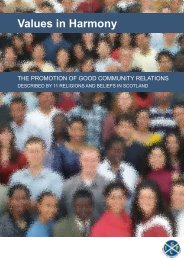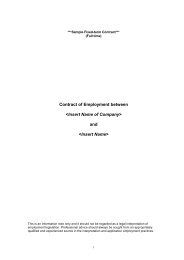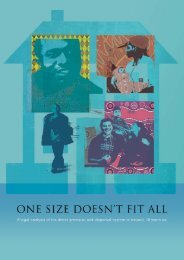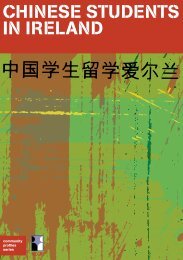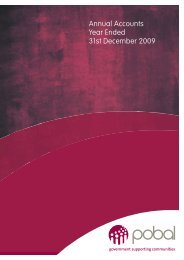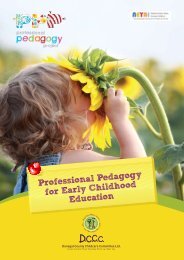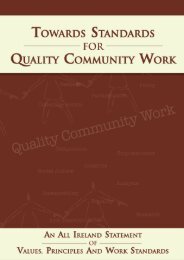WELCOMING A NEW STUDENTThe importance of support<strong>in</strong>g studentsenter<strong>in</strong>g a new school has been identified<strong>in</strong> a range of research with ‘students fromlower <strong>in</strong>come and m<strong>in</strong>ority ethnic groupsfound to be potentially more “at risk” <strong>in</strong>mak<strong>in</strong>g <strong>the</strong> transition to post-primaryschool’ (Gutman and Midgley, 2000).Recent research explor<strong>in</strong>g students’transition from first to second level schools<strong>in</strong> Ireland has shown that students tend tosettle quicker and experience lessdifficulties <strong>in</strong> schools where moredeveloped student <strong>in</strong>tegration programmesexist andstudents from non-national or Travellerbackgrounds report more transitiondifficulties than o<strong>the</strong>r students.(ESRI/NCCA, 2004. p.283)There are a number of ways <strong>in</strong> which aclassroom teacher can help support <strong>the</strong><strong>in</strong>tegration of a new student.• Introduce new students <strong>in</strong> a positiveway, focus<strong>in</strong>g on <strong>the</strong>ir capacities(“Goran speaks Croatian fluently, andalso speaks some English”) ra<strong>the</strong>r thanon <strong>the</strong>ir needs (“Goran doesn’t speakEnglish well”).• Provide structured opportunities for newstudents to work with o<strong>the</strong>r students for<strong>the</strong> first few days. Where languageallows, this can be done through pairedwork or group activities <strong>in</strong> most classes.Where <strong>the</strong>re is not a shared spokenlanguage, art, music or drama activitiesprovide ideal opportunities.• If possible, seat those who are beg<strong>in</strong>n<strong>in</strong>gto learn English with someone whospeaks <strong>the</strong>ir first language for <strong>the</strong> firstfew weeks. If <strong>the</strong>re is no-one who speaks<strong>the</strong>ir first language <strong>in</strong> <strong>the</strong> class, it maybe possible to <strong>in</strong>troduce <strong>the</strong> student toano<strong>the</strong>r member of <strong>the</strong> schoolcommunity (ano<strong>the</strong>r pupil, for example)who speaks <strong>the</strong>ir first language dur<strong>in</strong>gbreak time or at lunch time dur<strong>in</strong>g <strong>the</strong>school day. These arrangements shouldbe discont<strong>in</strong>ued after a few weeks, <strong>in</strong>order to ensure that <strong>the</strong> newly-arrivedstudent has an opportunity to developrelationships with his or her classmates.• Establish rout<strong>in</strong>es <strong>in</strong> <strong>the</strong> class which areclear and explicit and which can belearned and understood by students whoare new to <strong>the</strong> peculiarities of <strong>the</strong> Irisheducation system or who are learn<strong>in</strong>g<strong>the</strong> language of <strong>in</strong>struction as a secondlanguage.This will provide some basisof familiarity, which will allow pupils tolearn <strong>the</strong> ways <strong>in</strong> which <strong>the</strong> schoolsystem works.• Support all <strong>the</strong> students <strong>in</strong> develop<strong>in</strong>g an<strong>in</strong>clusive community <strong>in</strong> <strong>the</strong> classroom(ra<strong>the</strong>r than one <strong>in</strong> which <strong>the</strong> teachersimply polices and preventsdiscrim<strong>in</strong>ation) by identify<strong>in</strong>g howstudents can make each o<strong>the</strong>rcomfortable and feel that <strong>the</strong>y belong.This may mean that <strong>the</strong> students willagree strategies which <strong>the</strong>y <strong>the</strong>mselvesutilise to ensure that no one <strong>in</strong> <strong>the</strong>irclass is excluded.44<strong>Intercultural</strong> <strong>Education</strong> <strong>in</strong> <strong>the</strong> <strong>Post</strong>-<strong>Primary</strong> <strong>School</strong>
CLASSROOM PLANNING 4CHECKLIST: WHAT INFORMATION SHOULD THESUBJECT TEACHER HAVE WHEN A NEWSTUDENT JOINS THE CLASS?How are <strong>the</strong> names of <strong>the</strong> student and<strong>the</strong>ir parents correctly pronounced?What language(s) does <strong>the</strong> student have,and what is <strong>the</strong>ir level of proficiency <strong>in</strong><strong>the</strong>se language(s)?How does one say some key phrases <strong>in</strong><strong>the</strong> student’s first language, such as agreet<strong>in</strong>g, ‘please/thank you’, ‘jo<strong>in</strong> <strong>in</strong>’,‘stop’, ‘well done/very good’, etc?Are <strong>the</strong>re subjects <strong>the</strong> student will not betak<strong>in</strong>g and what will <strong>the</strong>y be do<strong>in</strong>g dur<strong>in</strong>gthose times?Are <strong>the</strong>re any cultural practices thatmight affect classroom <strong>in</strong>teraction? Are<strong>the</strong>re actions which are deemed<strong>in</strong>appropriate or rude <strong>in</strong> <strong>the</strong> student’shome culture but which may not causeoffence to members of <strong>the</strong> dom<strong>in</strong>antethnic group, or vice versa (show<strong>in</strong>gsomeone an open palm or <strong>the</strong> soles of <strong>the</strong>foot may be rude <strong>in</strong> some cultures; ayoung person mak<strong>in</strong>g eye contact with anadult may be rude <strong>in</strong> some Africancultures while <strong>in</strong> Traveller culture youngpeople often speak very directly andopenly to adults, someth<strong>in</strong>g which issometimes seen as rude <strong>in</strong> schools;stand<strong>in</strong>g close to a person may bedeemed rude <strong>in</strong> some cultures, while itmay be normal <strong>in</strong> o<strong>the</strong>rs etc.)? How isteach<strong>in</strong>g <strong>the</strong> student <strong>the</strong> culture of <strong>the</strong>school to be handled?What is <strong>the</strong> student’s religion, how is itpractised, and has this any implicationsfor classroom plann<strong>in</strong>g?Will <strong>the</strong> student have specificrequirements concern<strong>in</strong>g food, jewelleryor cloth<strong>in</strong>g (for example, <strong>the</strong> range oftastes catered for by <strong>the</strong> school canteenor <strong>the</strong> symbolism of <strong>the</strong> schools crest on<strong>the</strong> school uniform)?CREATING A SUPPORTIVE LANGUAGEENVIRONMENTLanguage is a key component of a person’sidentity as well as play<strong>in</strong>g a central part <strong>in</strong><strong>the</strong> learn<strong>in</strong>g process. Ireland is, and hashistorically been, characterised by l<strong>in</strong>guisticdiversity, with both Irish and Englishexist<strong>in</strong>g as first languages. To this must beadded <strong>the</strong> range of languages of recentimmigrants. The right to have one’s ownlanguage is important <strong>in</strong> enabl<strong>in</strong>g people todevelop a strong positive self-image. Peoplealso generally f<strong>in</strong>d it easier to developcomplex th<strong>in</strong>k<strong>in</strong>g <strong>in</strong> <strong>the</strong>ir first language.For both ethical and educational reasons,<strong>the</strong>n, it is important that <strong>the</strong> student’s firstlanguage is valued and affirmed with<strong>in</strong> <strong>the</strong>school context. It is also important tocreate an environment that supports <strong>the</strong>learn<strong>in</strong>g of a second language.Learn<strong>in</strong>g <strong>in</strong> a multi-l<strong>in</strong>gual environmentcan be a positive experience for allstudents. It highlights concretely <strong>the</strong>diversity of languages and cultures <strong>in</strong> <strong>the</strong>world and, as such, constitutes animportant resource for develop<strong>in</strong>g<strong>in</strong>tercultural capacities and abilities <strong>in</strong> allstudents irrespective of <strong>the</strong>ir ethnicity.Recognition and affirmation of <strong>the</strong>student’s first language can be achievedthrough• <strong>the</strong> teacher and students learn<strong>in</strong>gsome key words or phrases (greet<strong>in</strong>gs,simple <strong>in</strong>structions, etc.) <strong>in</strong> <strong>the</strong> students’first language• communicat<strong>in</strong>g positive attitudestowards l<strong>in</strong>guistic diversity andmulti-l<strong>in</strong>gual student’s skills andrecognis<strong>in</strong>g <strong>the</strong> capacities of secondlanguage learners ra<strong>the</strong>r than identify<strong>in</strong>g<strong>the</strong>m primarily as people with ‘languageneeds’• provid<strong>in</strong>g multil<strong>in</strong>gual resourceswhere possible.<strong>Intercultural</strong> <strong>Education</strong> <strong>in</strong> <strong>the</strong> <strong>Post</strong>-<strong>Primary</strong> <strong>School</strong> 45




